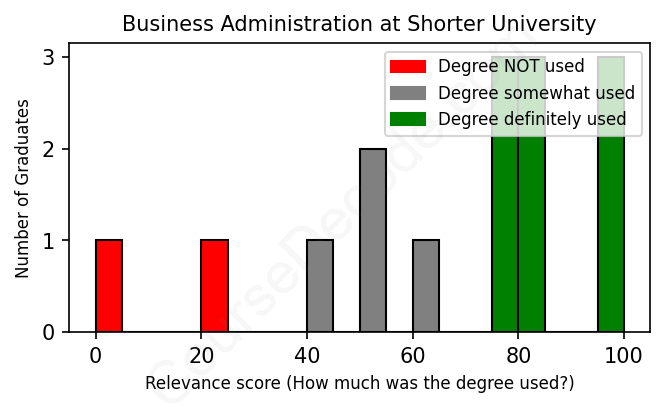
First, some facts. Of the Business Administration graduates from Shorter University we've analyzed , here's how many have used (or NOT used) their degree in their career:

These are estimates based on AI analysis of 15 LinkedIn profiles (see below).
The verdict? Slightly below average. Overall, with an average relevance score of 66%, Business Administration graduates from Shorter University have a slightly lower likelihood (-1%) of finding work in this field compared to the average graduate across all fields:
And for comparison, here's the chart for all profiles we've looked at across all degrees.
Also, after graduating, only 26% of these graduates have pursued further education other than another Bachelor's degree (such as a Masters degree or other), compared to the average across all profiles of 35%. This suggests a Bachelors degree is enough for most Business Administration graduates, and it's normal to look for work straight after graduation.
See the details:
|
Relevance score: 100% We think this person has gone into a career highly relevant to their degree. We think this person has gone into a career highly relevant to their degree.
DEGREE INFOGraduated in 2014 from Shorter University with a Bachelor of Business Administration (B.B.A.) in Business Administration. No other secondary education since. JOB HISTORY SINCE GRADUATIONGeneral Manager HARDEES RESTAURANT May 2016 - Present ABOUTHello, Im a very career driven and focused individual.I enjoy working in the management field. I work well with others. I bring enthusiasm to the forefront within the restaurant business. I work well under pressure in high volume restaurants. Im very dependable. Always willing to go far and beyond when it comes to customer service. |
The top 10 most common jobs done by the graduates we've analyzed (ranked most common to least) are:
When analyzing the jobs held by graduates of Shorter University's Business Administration program, it looks like there's quite a mix of roles that range from highly relevant to completely unrelated to the degree. A lot of folks have ended up in positions like Business Development Manager, Customer Operations Manager, and Director of Financial Aid, which closely align with the fundamental skills they learned in business school. These roles usually involve strategic management, customer relations, and operations — all of which are core topics in Business Administration. On the flip side, you also have graduates working in positions like Maintenance Superintendents, Emergency Management Coordinators, or even artists, which don't really tap into that business training. While some of these roles might touch on a few business principles here and there, they aren't primarily driven by the core concepts of Business Administration.
Overall, graduates have a decent amount of jobs that are related to their degree, especially those in management, analysis, or business development. However, it's clear that some have ventured into fields that don't require much of their Business Administration training. This variety shows that a Business Administration degree offers flexibility, allowing graduates to explore different careers, but the relevance to their studies isn't always strong. It's like they have a ticket to multiple rides, but some are definitely more in line with the rollercoaster they trained for than others!
Here is a visual representation of the most common words in job titles for Business Administration graduates (this is across all Business Administration graduates we've analyzed, not just those who went to Shorter University):

When looking at the career paths of graduates from Shorter University who studied Business Administration, it’s clear that there’s a mix of outcomes, but many have found themselves in positions closely related to their degree. Right after graduation, a lot of individuals embarked on jobs in customer service, management, and administrative roles. For instance, many started as customer service representatives or in entry-level management positions, which is pretty common for business grads. Some took slightly unconventional routes; for example, a few became entrepreneurs right away, launching businesses like woodturning shops.
Fast forward five to ten years, and you can see a more diverse array of careers. While some have climbed the corporate ladder into managerial roles, others transitioned into specialized fields like financial aid, data analysis, or human resources. It’s impressive to note that a few have not just found stable jobs but have also moved into significant positions in their companies or even started their own ventures. However, there are also cases of graduates who ended up in roles that seem less aligned with their degree or perhaps in industries not directly connected to what they studied. Overall, while there are some mixed results, many graduates appear to have navigated their careers into meaningful and relevant positions within business contexts.
Honestly, getting a Bachelor’s degree in Business Administration can be a pretty manageable experience, especially if you’re organized and stay on top of your work. At Shorter University, like many other places, the coursework isn’t overly intense, but it does require some dedication. You’ll tackle subjects like management, marketing, and finance—which can range from straightforward to a bit challenging, depending on your strengths and interests. It’s not necessarily "easy," but if you engage with the material and participate in group projects or discussions, it can be a lot of fun and very rewarding. Overall, it’s designed to be accessible, so with consistent effort, most students should be able to handle it without too much stress.
Most commonly, in the LinkedIn profiles we've looked at, it takes people 4 years to finish a Bachelor degree in Business Administration.
Looking at the career paths of these Shorter University graduates, it seems they’ve had a pretty mixed bag in terms of making decent money. Some, like the graduates who ventured into roles like Director of Business Operations and Tax Accountant, likely earn a solid salary, particularly if they have advanced or managerial positions with more responsibilities. Others, like the Maintenance worker and the General Manager at Hardees, may not be pulling in as much, which is more common in those types of roles. However, positions in fields like Human Resources, Business Development, and specialized roles like Business Intelligence Analyst or Financial Aid Director generally trend towards better pay. So, overall, while some are definitely doing alright financially, others might be scraping by a bit more, which is pretty typical in the job market.
Here is a visual representation of the most common words seen in the "about" section of LinkedIn profiles who have a Bachelor degree in Business Administration (this is across all Business Administration graduates we've analyzed, not just those who went to Shorter University). This may or may not be useful:

Here are all colleges offering a Bachelor degree in Business Administration (ordered by the average relevance score of their Business Administration graduates, best to worst) where we have analyzed at least 10 of their graduates: